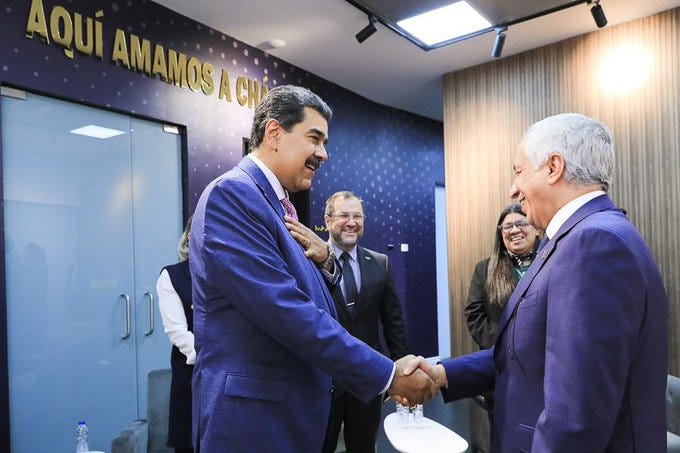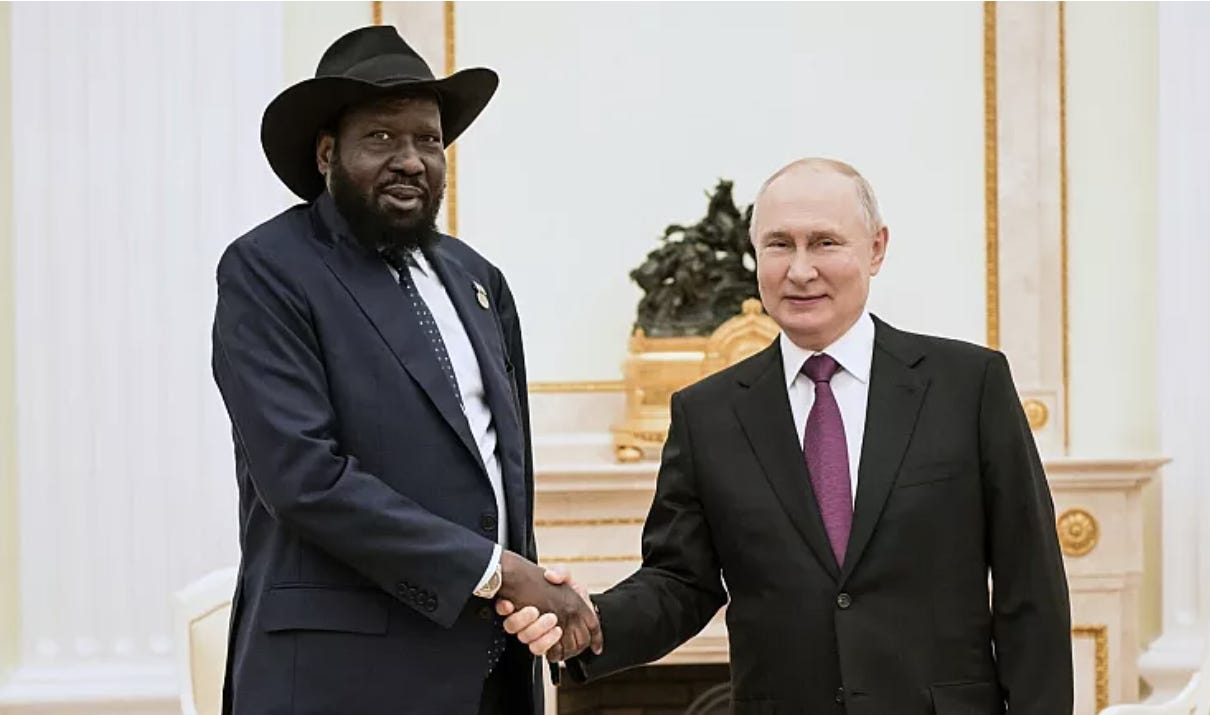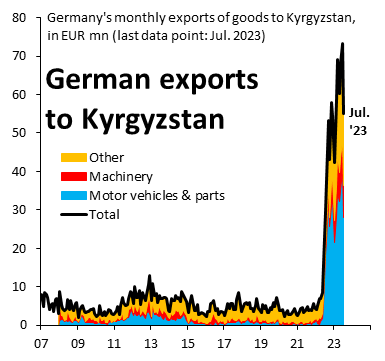This week - Qatar-Venezuela, Saudi-Palestine, Russia-South Sudan, Central Asian trade, Burkina Faso failed coup?
Week of October 2nd, 2023.
This week we are continuing with two topics we are closely following: Venezuela on its path to elections in 2024 and turmoil in the Sahel —coupled with Russia’s growing influence in Africa. We are also bringing up an update on Saudi Arbia’s diplomatic efforts.
We are also bringing up some curious findings on Central Asia and Turkey’s flourishing trade, as bridges between western countries and Russia. Since we have previously discussed the dollar and the yuan in Argentina, Latinometrics has published an interesting graph to visualise how trade with China has grown to surpass the US —athlough we are not talking about the topic this week. And of course, skip to the end if you’re just here for central bank updates.
Qatar-Venezuela high-level visits

Qatar’s foreign affairs minister, Soltan bin Saad Al-Muraikh landed in Caracas on September 27th. Doha has been a key mediator between the US and Venezuela –as with other parties, like Iran and the Taliban. In June, El Pais revealed secret meetings in Qatar between Jorge Rodriguez, National Assembly President, and Juan Gonzalez, Deputy Assistant Secretary of State for Western Hemisphere Affairs.
Just before the UN General Assembly in New York, Qatari head of state Sheikh Tamim bin Hamad Al Thani visited Guyana. The South American country is immersed in an old territorial dispute with Venezuela, inherited from the colonial period, which has recently resurfaced. Tanner Manley from the Middle East Council on Global Affairs believes that the high-level visits could be related, “given Qatar’s track-record as a trusted mediator, including between the US and Venezuela.”
Venezuela primaries
As opposition primaries near, the date could be pushed back from October 22nd to November 19th. This has been announced since the organisers and the state’s National Electoral Council (CNE) have entered talks, as the latter has offered “technical assistance”. A source from a renowned polling agency speculated that without CNE assistance, the primaries would not have the resources to roll out the voting infrastructure.
Saudi Arabia appoints non-resident ambassador to Palestine

Saudi Arabia has appointed its first ambassador to Palestine, Naif Al-Sudairi who was received by Palestinian President Mahmoud Abbas in the occupied West Bank on Tuesday, September 26th. Al-Sudairi is currently serving as Saudi Arabia’s ambassador to Jordan and was given his new role as the first Saudi ambassador to Palestine in August under a non-resident status. Al-Sudairi's status means that, unlike most ambassadors, he will not be residing in Palestinian territory whilst performing his diplomatic responsibilities and will instead conduct them from Jordan. During his meeting with Abbas, Al Sudairi re-emphasised Saudi Arabia’s support for Palestine and stressed that his nation would be a Palestinian state with East Jerusalem as its capital. This comes amid ongoing normalization talks between Saudi Arabia and Israel.
Expanding international representation for Palestine
Historically, Palestine has always struggled to maintain consistent diplomatic relations due to the ongoing Israeli occupation of its lands and its own political divisions. This is especially the case with non-Arab states despite a majority of the nations recognizing Palestine’s right to self-determination. Currently, most nations have non-embassy representation in Palestine, however, this new development could present new opportunities for Palestine’s international presence and may lead to other countries willing to establish embassy representation in Jerusalem. On the other hand, efforts by Israel and its allies to establish Jerusalem as its capital will inevitably add challenge to these aspirations.
South Sudan-Russia meeting

President of South Sudan Salvar Kiir Mayardit met Russian President Vladimir Putin on Saturday in Moscow to discuss matters of improving bilateral relations between the two states encouraging investment from Russia to improve South Sudan’s infrastructure and energy sector. South Sudan is the most recently recognized sovereign state, gaining independence from Sudan in 2011 following years of regional conflicts and ethnic tensions. The country is also among the least developed nations in the world, coming last in terms of the Human Development Index (HDI) out of 191 countries. The meeting also addressed the topic of security, amid growing fears of unrest and the number of coups that occurred in other African states as South Sudan prepares its first elections to take place in December 2024.
Growing Russian influence in Africa
Similar to how China’s presence in the African continent is increasing, Russian interest in the region has also grown significantly in recent years, especially following the invasion of Ukraine in 2022. Russian Minister of Foreign Affairs Sergei Lavrov has repeatedly stressed the importance of Africa in Russia’s foreign policy not just as a means of forming new alliances and maintaining international relevance, but as a means of becoming an important partner to emerging economies that are set to transition out of low-income status within the coming decades. Countries like Rwanda and Tanzania have presented impressive economic growth over the last several years, with ambitious development projects underway.
Central Asia trade skyrockets after Russia-Ukraine war

Robin Brooks, the chief economist at the Institute of International Finance has been highlighting Central Asia’s growing trade since Russia’s offensive starting in February 2022. For instance, “in the first 7 months of 2023, German exports to Kyrgyzstan are up 1400% from the same period in 2019.”

Interestingly, while Turkey is not part of the western, broad effort to cut commercial ties with Russia, its trade has also increased in relation with Central Asia. That is, even though Russia-Turkey exchange has not suffered. The story here could go beyond; there would be new routes transiting through both Turkey and Central Asia, bridging between Russia and its declared rivals.
Burkina Faso’s Traore says coup attempt foiled

Captain Ibrahim Traoré announced that he has foiled a coup against him on September 26th. On the day, thousands took to the streets to show their support. Traoré himself came to power in a military coup d’état September 2022, after having supported another successful one in January of that year.
The alleged event comes days after the announcement of the “Alliance of Sahelian States”, between Burkina Faso, Mali, and Niger. In Ouagadougou, the national assembly also authorised for Burkinabé troops to intervene in neighbouring Niger. The three are ridden by conflict with insurgencies, and until recently relied extensively on military and development aid from North America and Europe, especially France. In Burkina Faso, 17,000 people have died due to the current conflict and around 2 million have been displaced, according to the Armed Conflict Location and Event Data Project (ACLED), a Wisconsin-based NGO.
Central Banks
Despite the pressure from the executive branch and the business community, Colombia’s central bank is keeping rates put at 13.25%. Five board members voted in favour, while two voted for a 25 basis points cut. The reason given for the final decision was that inflation is still high even if it is falling: CPI was 11.4% in August, or 9.9% for the basic inflation index.
The Central Bank of Somalia is reportedly close to securing a debt relief agreement with the IMF under its Heavily Indebted Poor Countries Initiative, which would see Somalia’s foreign debt reduced from $5.2 billion dollars to $600 million. Somalia is still required to meet further conditions to secure debt relief by the end of the year.
The editors: Elias Ferrer and Slim Mezlini.





